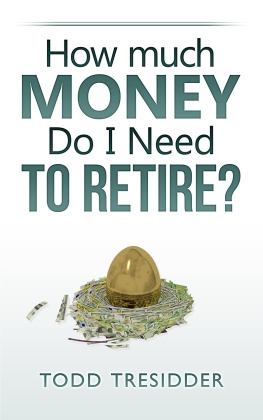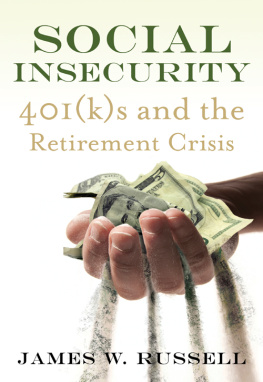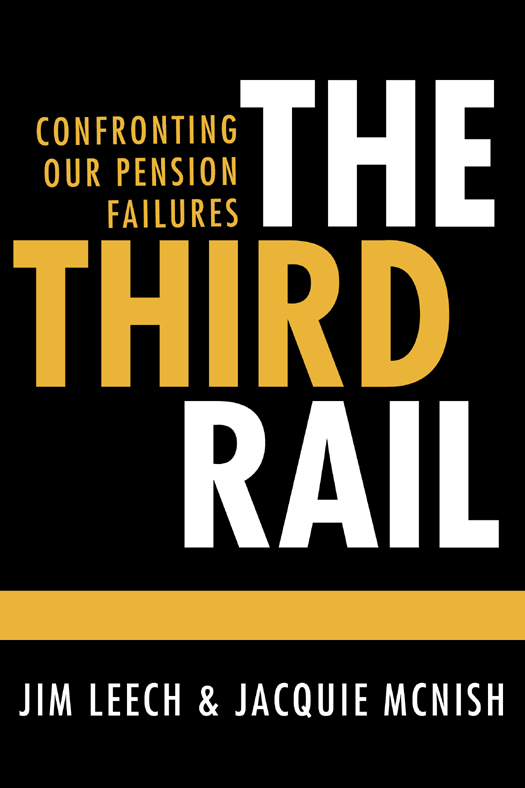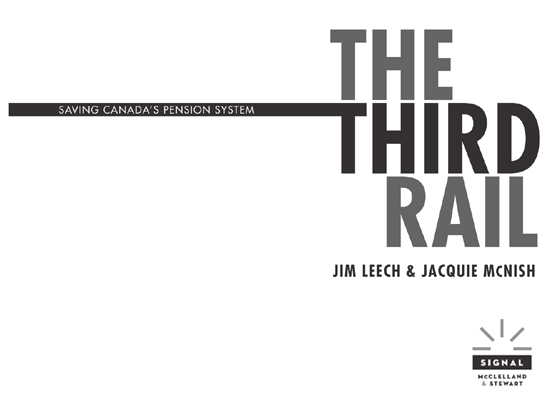Copyright 2013 by Jim Leech and Jacquie McNish
Signal is an imprint of McClelland & Stewart, a division of Random House of Canada Limited, a Penguin Random House Company
All rights reserved. The use of any part of this publication reproduced, transmitted in any form or by any means, electronic, mechanical, photocopying, recording, or otherwise, or stored in a retrieval system, without the prior written consent of the publisher or, in case of photocopying or other reprographic copying, a licence from the Canadian Copyright Licensing Agency is an infringement of the copyright law.
The views and opinions expressed in this book are the personal views and opinions of the authors and do not necessarily reflect those of OTPP .
Library and Archives Canada Cataloguing in Publication data available upon request.
eBook ISBN: 978-0-7710-4680-3
McClelland & Stewart,
a division of Random House of Canada Limited,
a Penguin Random House Company
One Toronto Street
Suite 300
Toronto, Ontario
M 5 C 2 V 6
v3.1
We dedicate this book to
our children and their children,
who deserve a better pension future
Jennifer Cumming, Joanna Thiessen, and Andrew Leech;
Cedar, Sydney, Travis, Aurora Joy, and Sky
Jim Leech
Harry and Lewis Cole
Jacquie McNish
CONTENTS
CHAPTER 1
CANADAS PENSION PROMISE
Worn Out
CHAPTER 2
NEW BRUNSWICK
Palliative Care
CHAPTER 3
RHODE ISLAND
Truth in Numbers
CHAPTER 4
THE NETHERLANDS
The Polder Model
CHAPTER 5
SOLVING CANADAS PENSION CRISIS
The Golden Fish
PROLOGUE
When everything is going right, it takes ten minutes for John Ferguson to drive south from his office in the suburb of Millidgeville to Saint John, New Brunswick. But everything was far from right on the afternoon of April 11, 2005. About twenty minutes after he had left work, ten spent worrying, Ferguson finally arrived at his destination near the Saint John harbour: the fifteen-floor cement bunker that houses City Hall. A broad-shouldered, muscular man of forty-one with close-cropped, mica-flecked hair, Ferguson clenched the steering wheel and stared at the cement wall housing his city government. I cant do this, he said out loud, then threw his Pontiac Vibe in reverse and squealed off.
John Ferguson was afraid.
He hadnt felt this way since he was eleven, when, upon returning to live in Saint John after years away, the new kid in class found himself bullied. The first recess he was pushed to the ground, the next day it was a punch to the head. The hazing continued until his father noticed the cuts and instructed his son to fight back or stock up on bandages. It was the start of four to five years of being in arguments, Ferguson remembers. So many that his high school principal gave him the nickname Mr. Scrapper.
Ferguson comes from a long line of scrappers. His father is one of seventeen brothers and sisters from Tracadie, an Acadian town that never recovered from the collapse of timber. Hardship was a way of life. One great-grandfather was sliced in half by a mill saw. Fergusons made ends meet by erecting telephone poles, trapping, cutting hair, and selling dry goods. John Fergusons grandfather ran a barbershop and a fleet of garbage trucks. In our family it was felt you had to stand up and face things, Ferguson says.
As a teenager, Ferguson made his mark as a nimble, combative athlete, excelling in high school hockey and football. But its one thing to battle middle linebackers and schoolyard bullies, quite another to fight the power-brokers of City Hall, and in the spring of 2005 John Ferguson found himself in the crosshairs of a brutal challenge to his professional career. Saint John wanted to silence him, and Ferguson knew enough about local politics to understand that the citys political establishment might cut a man in half faster than any New Brunswick sawmill.
How did a civic-minded jock end up facing public execution? Ferguson asks himself the same question. After graduating from high school, the ex-athlete landed a job as a recreation supervisor for a Saint John community centre. In 1996, the province hired him as a consultant to help other communities with local programs. In his spare time he played hockey, ran a weekend movie theatre, managed bike rodeos, and lobbied the city to invest in recreation. Such public-mindedness won him friends, and in 2004 he ran for city council to have more say in community programs.
Recreation projects werent on tap when Ferguson sat down for his first council meeting in June 2004. One pressing bit of business for Mayor Ivan Court and the citys new council was approving trustees to the pension plan board, a $260 million fund that looked after the retirement accounts of 1,500 city workers and retirees. Reappointing the plans experienced trustees, a senior city official warned, was vital because the fund had a multimillion-dollar deficit. Ferguson voted in favour of the proposed trustees a mix of senior city staff, councillors, and local professionals and shrugged off the deficit news. After all, he was a sports and rec guy.
Three months later, city councillors learned that the pension deficit was $44 million. Even to a layman like Ferguson, the number was stunning. Saint John was on the hook to replenish a pension deficit that amounted to nearly half the citys annual revenues. More remarkable was the councils reaction. There was very little conversation, he says.
Ferguson began asking questions. What caused the deficit? How would the city replenish the shortfall? The more questions Ferguson asked, the more unpopular he became. Mayor Court brushed off his concerns. City managers told him he was overreacting. When Ferguson tabled a motion at a closed council meeting to appoint a committee to review the looming crisis, it was voted down. Later when council agreed to let him join a working group to study solutions, his proposal to issue a bond to pay for the deficit went nowhere.
Finally, in March 2005, Ferguson decided to sound the alarm. The trigger was a report in Saint Johns daily newspaper, the Telegraph-Journal. According to a March 2 story, the city was six months late filing a devastating actuarial report outlining the pension deficit. Saint John was in a legally precarious position because an unusually high number of employees with questionable long-term disabilities had been allowed to take early retirement and collect full pensions. This, Ferguson figured, was the problem the city wanted to sweep under the rug.
As he drove around Saint John that April afternoon in 2005, worried for both his career and hometown, Ferguson was apprehensive. He had planned to raise a stink about pensions that night at council. He had already quietly consulted with city officials, media, and union officials. A few days earlier, however, contacts warned against taking his fears public. It would cause a panic, make things worse.
After twenty minutes of fretful driving, Ferguson settled down. Hed chased away bullies before. Mr. Scrapper could do it again. Come on, John, he said to himself, you can do this. Pulling his Pontiac into a U-turn, Ferguson headed back to the city.
An hour later, he sat with fellow councillors at a horseshoe table on the first floor of City Hall. Shortly after the public session began he leaned into the microphone and started speaking from point-form notes. The notes were soon forgotten, however, and his voice grew louder, more emphatic. Saint John was facing a severe pension problem, he warned. There was lots of blame to go around, he said, jabbing his finger into the air. The plan was poorly managed, and some supervising trustees were conflicted because they were city employees who benefited from the plan. Worse still, he added, the pension board had been lax about allowing employees to use long-term disability claims to retire early with full benefits.









